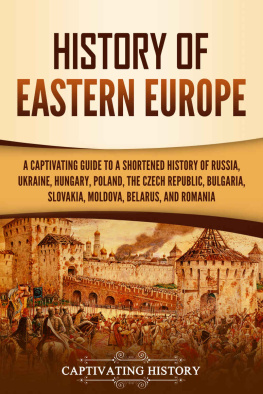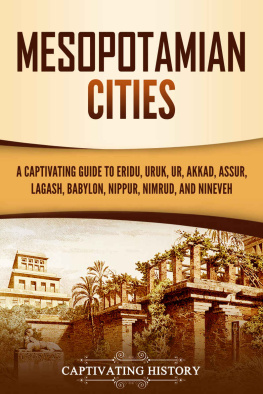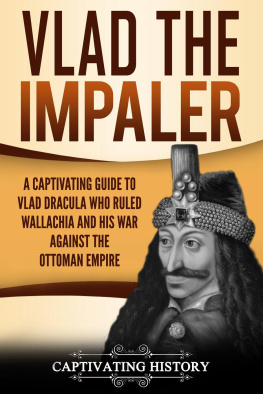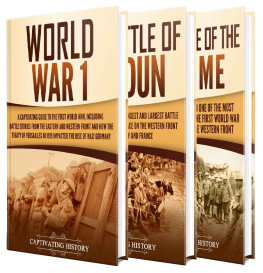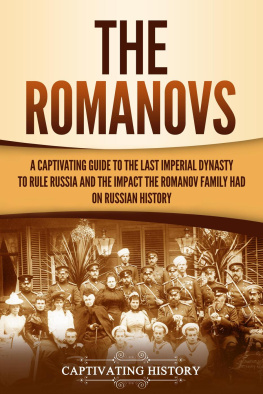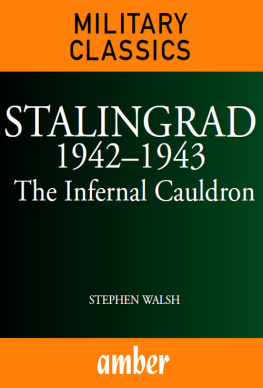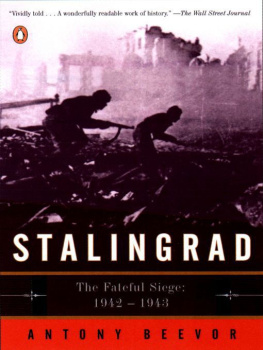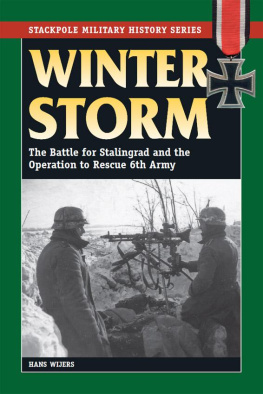Captivating History - Stalingrad: A Captivating Guide to the Battle of Stalingrad and Its Impact on World War II
Here you can read online Captivating History - Stalingrad: A Captivating Guide to the Battle of Stalingrad and Its Impact on World War II full text of the book (entire story) in english for free. Download pdf and epub, get meaning, cover and reviews about this ebook. year: 2020, genre: History. Description of the work, (preface) as well as reviews are available. Best literature library LitArk.com created for fans of good reading and offers a wide selection of genres:
Romance novel
Science fiction
Adventure
Detective
Science
History
Home and family
Prose
Art
Politics
Computer
Non-fiction
Religion
Business
Children
Humor
Choose a favorite category and find really read worthwhile books. Enjoy immersion in the world of imagination, feel the emotions of the characters or learn something new for yourself, make an fascinating discovery.

- Book:Stalingrad: A Captivating Guide to the Battle of Stalingrad and Its Impact on World War II
- Author:
- Genre:
- Year:2020
- Rating:3 / 5
- Favourites:Add to favourites
- Your mark:
- 60
- 1
- 2
- 3
- 4
- 5
Stalingrad: A Captivating Guide to the Battle of Stalingrad and Its Impact on World War II: summary, description and annotation
We offer to read an annotation, description, summary or preface (depends on what the author of the book "Stalingrad: A Captivating Guide to the Battle of Stalingrad and Its Impact on World War II" wrote himself). If you haven't found the necessary information about the book — write in the comments, we will try to find it.
Captivating History: author's other books
Who wrote Stalingrad: A Captivating Guide to the Battle of Stalingrad and Its Impact on World War II? Find out the surname, the name of the author of the book and a list of all author's works by series.
Stalingrad: A Captivating Guide to the Battle of Stalingrad and Its Impact on World War II — read online for free the complete book (whole text) full work
Below is the text of the book, divided by pages. System saving the place of the last page read, allows you to conveniently read the book "Stalingrad: A Captivating Guide to the Battle of Stalingrad and Its Impact on World War II" online for free, without having to search again every time where you left off. Put a bookmark, and you can go to the page where you finished reading at any time.
Font size:
Interval:
Bookmark:
Stalingrad
A Captivating Guide to the Battle of Stalingrad and Its Impact on World War II
Copyright 2020
All Rights Reserved. No part of this book may be reproduced in any form without permission in writing from the author. Reviewers may quote brief passages in reviews.
Disclaimer: No part of this publication may be reproduced or transmitted in any form or by any means, mechanical or electronic, including photocopying or recording, or by any information storage and retrieval system, or transmitted by email without permission in writing from the publisher.
While all attempts have been made to verify the information provided in this publication, neither the author nor the publisher assumes any responsibility for errors, omissions or contrary interpretations of the subject matter herein.
This book is for entertainment purposes only. The views expressed are those of the author alone, and should not be taken as expert instruction or commands. The reader is responsible for his or her own actions.
Adherence to all applicable laws and regulations, including international, federal, state and local laws governing professional licensing, business practices, advertising and all other aspects of doing business in the US, Canada, UK or any other jurisdiction is the sole responsibility of the purchaser or reader.
Neither the author nor the publisher assumes any responsibility or liability whatsoever on the behalf of the purchaser or reader of these materials. Any perceived slight of any individual or organization is purely unintentional.
Free Bonus from Captivating History: History Ebook
Hi History Lovers!
My name is Matt Clayton, and Im the creator of Captivating History. First off, I want to THANK YOU for reading our books in the Captivating History series. As an avid reader of History myself, I aim to produce books that will hold you captive.
Now you have a chance to join our exclusive history list so you can get the ebook below for free as well as discounts and a potential to get more history books for free! Simply click the link below to join.
P.S. If you join now, you will also receive a free Mythology book. Remember that its 100% free to join the list.

Click here to access your bonus
Also, make sure to follow us on:
Twitter: @Captivhistory
Facebook: Captivating History: @captivatinghistory
The Battle of Stalingrad is rightfully known as the turning point of the Second World War. Before the battle, which took place from August 1942 until the beginning of February 1943, the Germans were victorious everywhere, despite some localized setbacks (for example, at Moscow in 1941). After Stalingrad, the Germans were constantly pushed back, with some notable examples being Kursk in the summer of 1943 and the Bulge in 1944.
During WWII, the Soviet Union suffered somewhere in the neighborhood of twenty million dead. For those of you reading in the United States and the United Kingdom, the death toll for those nations in the war was around 415,000 and 483,000, respectively. In the approximate six months of the Battle of Stalingrad, the Germans, their Hungarian, Romanian, and Italian allies, and the Soviets lost an estimated one million men.
As the battle wore on, the German soldiers gave the battle in Stalingrad a nickname: Der Rattenkrieg, or the war of the rats. The fighting in Stalingrad took place in the ruins of a large city, as well as below in the sewers. Much of the fighting was close-quarter combat, and in many cases, it was hand-to-hand. Men died by the hundreds of thousands, just like dirty, savage rats.
Adolf Hitler originally wanted his 6 th Army to protect the northern flank of his armies as they drove into the oil fields and fertile farmlands of the Caucasus, but as time went by, the battle took on a life of its own. In Hitlers mind, the city that bore Stalins name became a symbol of Soviet resistance and of the Soviet leader himself. If the Germans took the city, perhaps the Soviet Union (USSR) would finally fall, taking Stalin down with it.
July 31 st , 1942: Hitler orders his troops to move on Stalingrad.
August 23 rd th : Initial heavy bombing of the city.
August 24 th : North of the city, German troops reach the Volga River. In surveying the city, the commander of the German 14 th Panzer Division says that the Germans should not attack the city and set up defensive lines farther westward, as the city is too defensible. He is ignored.
August 25 th : Fighting begins in the city itself.
September 13 th th : The city is divided. The Germans are in the north and south, and the Soviets are in the middle. They will gradually be pushed back to an area about 200 meters (around 655 feet) from the Volga, except for a few pockets of resistance, such as Pavlovs House and the factories.
Between September to November: There are 700 organized large-scale German attacks on and in the city.
Late September: General Franz Halder, chief of staff of the German High Command, expresses doubt to Hitler about the ability of the Germans to win at Stalingrad. He voices concerns about Soviet strength, long supply lines, dwindling German manpower reserves, and the weakness of the German allies on the wings of the Stalingrad front. Hitler removes him from command, and he is forcibly retired.
October 7 th : Germans occupy much, but not all, of the Tractor Factory complex. The Soviet 62 nd Army under Vasily Chuikov is down to approximately 700 men and are pushed back within meters of the Volga. Ninety percent of the city is in German hands. Despite this, Soviet intelligence reports indicate German morale is low and their physical condition poor, while Soviet morale seems to be growing, sparked by the determined defense of the city.
November 11 th : The last major German push fails to take the city.
November 13 th : Stalin approves Operation Uranus.
On November 3 rd , German soldier Wilhelm Hoffman wrote in his diary, In the last few days, our battalion has several times tried to attack the Russian positionsto no avail. On this sector, the Russians wont let you lift your head. There have been a number of cases of self-inflicted wounds and malingering among the men.
On November 10 th , while the Russians were planning a big surprise attack, Hoffman wrote, A letter from Elsa today. Everyone expects us home for Christmas. In Germany everyone believes we already hold Stalingrad. How wrong they are. If they could only see what Stalingrad has done to our army.

Illustration 1: German veteran well into the campaign
Hitlers armies invaded the USSR on June 22 nd , 1941, setting off Operation Barbarossa. Three million men, more than three thousand tanks, and thousands of combat aircraft surged across the Soviet border within days, and the Germans pushed the Soviet Red Army back a hundred miles or more. The attack came as a total shock to Josef Stalin, the Soviet leader, despite the many warnings he had received from his military officials, diplomats, and spies.
Germany and the Soviet Union had signed a non-aggression pact, known as the Molotov-Ribbentrop Pact, in August 1939. This pact divided Poland between them, gave Stalin the green light to annex the Baltic states without German interference, and allowed Stalin to make demands on Finland without having to worry about Hitler. Both sides benefited from the pact in other ways as well. Germany would buy huge amounts of Soviet raw materials and food; in return, the Germans would not have to worry about a Soviet conflict when it turned to attack Western Europe. The Soviets, on the other hand, would get hard currency, German machinery, factory parts, and other highly refined goods.
Font size:
Interval:
Bookmark:
Similar books «Stalingrad: A Captivating Guide to the Battle of Stalingrad and Its Impact on World War II»
Look at similar books to Stalingrad: A Captivating Guide to the Battle of Stalingrad and Its Impact on World War II. We have selected literature similar in name and meaning in the hope of providing readers with more options to find new, interesting, not yet read works.
Discussion, reviews of the book Stalingrad: A Captivating Guide to the Battle of Stalingrad and Its Impact on World War II and just readers' own opinions. Leave your comments, write what you think about the work, its meaning or the main characters. Specify what exactly you liked and what you didn't like, and why you think so.


